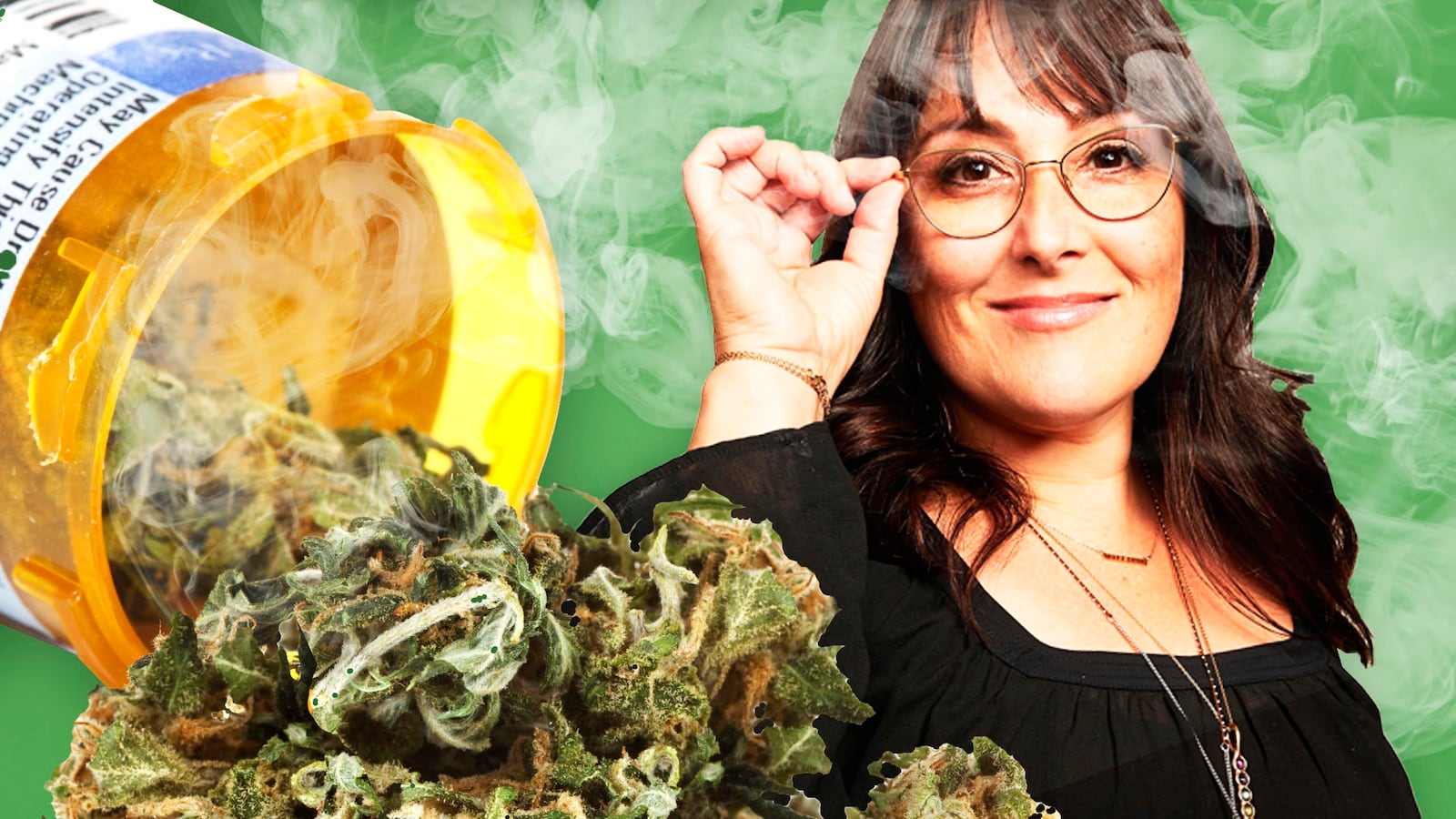AUSTIN, Texas — It’s Monday night and I’m smoking a joint with Ricki Lake. Well, I’m smoking. She is occasionally pulling on her mini PAX Era vaporizer, which she lets me try as well.
“I’m a one-to-one kind of girl,” she tells me, referring to the one-to-one ratio of THC to CBD oil that many aficionados swear by. When she does smoke or eat edibles, she says, “I can get paranoid, I can get quiet, I don’t know, it’s unpredictable with me. I don’t like feeling stoned, I like feeling a little elevated.”
The former daytime talk show host refers to the cannabis oil in the device as “medicine.” That makes sense if you have seen the new documentary she produced, which just had a triumphant and emotionally charged premiere at the South by Southwest festival last weekend. Weed the People, directed by filmmaker Abby Epstein, sounds like it might be a stoner movie; it is anything but.
Lake’s first major documentary feature since 2008’s The Business of Being Born chronicles the efforts of several families who are using cannabis oil to treat their children’s terminal cancers. The film makes a very convincing case that, used in conjunction with chemotherapy, high-dose treatments of the concentrated cannabinoid compound can actually shrink and even eliminate tumors.
“My husband seduced me with edibles,” Lake tells me. Weed the People is dedicated to her ex-husband Christian Evans, who is also credited as a producer. Evans struggled with bipolar disorder and committed suicide last February. “This film would not have happened if it weren’t for my husband,” she says.
In 2011, Lake decided to appear as a candidate on Dancing with the Stars. Among the fans who tuned in each week to see her strut her stuff on stage was a little girl suffering from a genetic disease called Neurofibromatosis 1. Her mother reached out to Lake on Twitter and asked for help.
“For some crazy reason, Christian and I moved them into our house for six weeks to try to find alternative treatments for her,” Lake told the SXSW audience during a Q&A after the film’s premiere Sunday morning. “My husband had been researching CBD long before Sanjay Gupta was talking about it and we went on this journey together.”
As soon as she told her friend Abby Epstein, who had directed The Business of Being Born, Epstein told her, “This is our next movie.”
Because marijuana is still classified as a Schedule 1 drug at the national level, very little research has been done on the potential tumor-shrinking properties of cannabis oil. A gut-punch comes late in the movie when the filmmakers remind the audience that these restrictions are only getting tighter under Attorney General and notorious marijuana foe Jeff Sessions.
“It’s a travesty,” Lake says. “But you can’t argue with these results with these children.” As more and more states legalized medical and recreational marijuana, the filmmakers began to think their moment for a movie like this had passed. But when Trump got elected and installed Sessions, they realized it was “more timely than ever.”
“I do think these movies have a power to them,” Lake says. She has witnessed that power in the 10 years since The Business of Being Born was released. Over that time, she says, the home birth rate has doubled and the c-section rate has “flatlined for the first time in decades.” Lake credits both of those trends to her film.
The film also pushes back against the argument that marijuana damages the developing brain, with some researchers claiming it can lead to slightly lower IQ levels later in life when someone starts consuming it before about 15 years old. But as one mother of a very sick child says in the film, even if that is the case, “it’s a small price to pay.”
“We wanted to focus on kids because it kind of gets rid of the stigma,” Lake says. “It’s not like they’re using it to get high. That’s not the case, these are babies.”
When I ask Lake if she thinks these ambitious documentaries are in some way a “response” to the type of often exploitive daytime television she engaged in for most of the 1990s, she says she views it more as a “redemption.”
“I’m actually really proud of the show I did,” she says. “But that was not my voice. My name was on the rug, and I was very authentic, but even though I was named as a producer, I didn’t really take part in the subject matter. These movies are much more me.” Next up, she’s planning to produce a film that examines the potentially harmful effects of birth control on women’s bodies.
Looking around the backyard of friends, collaborators and journalists, Lake says, “It’s safe to say I was a tad bit on the fence” about the idea of gathering people together for a weed party during SXSW.
“But I guess it’s an honor to say I got high with Ricki Lake,” she jokes. “It sure beats doing a talk show.”






